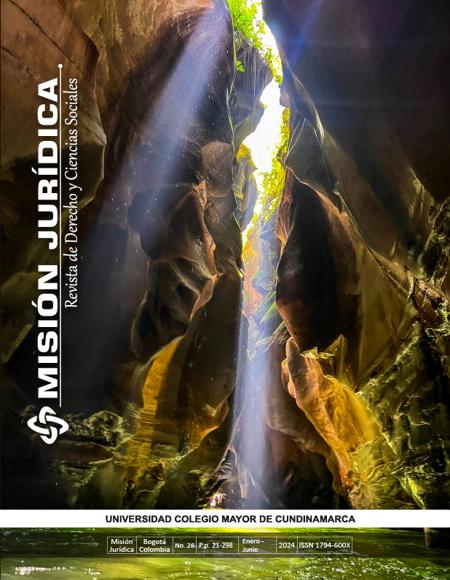Exception of Unconventionality in Colombian State’s Public Proceedings
Excepción de inconvencionalidad en las actuaciones públicas del Estado colombiano

This work is licensed under a Creative Commons Attribution-NonCommercial-NoDerivatives 4.0 International License.
COPYRIGHT PROVISIONS
Every papper included in the magazine can be reproduced whole or in part, provided that respect for its original content, the source is acknowledged and is used with non-commercial academic. Legal mission and its content is protected under a license Creative Commons Attribution-Noncommercial-

Misión Jurídica is distributed under a Creative Commons Attribution-NonCommercial-NoDerivar 4.0 International License.
Based on a work in http://unicolmayor.edu.co/publicaciones/index.php/mjuridica/index.
Permits that go beyond what is covered by this license can be found at http://unicolmayor.edu.co/publicaciones/index.php/mjuridica/index.
Show authors biography
Within the framework of the boundaries to the exercise of “ius puniendi” as legitimate measures to keep at bay disproportionate use of police powers, as enshrined in the rule of law, a normative supranational boundary has emerged to safeguard citizens’ fundamental rights. Such boundaries are subject to international (positive & negative) obligations that States parties must abide by once ratified. In order to categorize systematically the exception of unconventionality for more sustainable legal proceedings, a hermeneutical historical-analysis was done of case-by-case examinations to determine its reach in internal normative systems. This is a sample of supralegal guarantee that allows us to set some modulating criteria in the application of rules in compliance by deploying the same conditions of the constitutionality block. Specifically, when a high-court has adopted a line of jurisprudence with the effect of absolute constitutional res judicata, it becomes impossible for both judges and procedural actors to resort to exception of unconstitutionality in Colombian public proceedings. However, we find the exception of unconventionality as the last guarantee of effective legal protection, even when the constitutionality of human rights violations has been declared, according to the dissenting multilateral precedent of the competent body in regional human rights protection systems.
Article visits 78 | PDF visits 57
Downloads
- Abbott, K.W. & Snidal, D. (2000). Hard and Soft Law in International Governance. International Organization. P. 436.
- Alsina, H. (1961). Tratado Teórico Práctico de Derecho Procesal Civil y Comercial. T. II, B. Aires, Editar S. A. Editores.
- Asamblea Nacional Constituyente. (1991). Constitución Política de Colombia de 1991.
- Austin, J. (1832). The providence of jurisprudence determined. John Murray.
- Caracol Radio. Cartagena, C. (2023). Consejo de Estado Inaplica Revisión Automática de Sanción a exalcaldesa de arjona, bolívar. Caracol Radio.
- Carnelutti, E. (1994). Sistema de Derecho Procesal Civil. T. II, B. Aires. Editorial UTHEA.
- Chioventa, G. (1949). Ensayos de Derecho Procesal Civil. B. Aires. Editorial EJEA.
- Corte Constitucional de Colombia. (1998). Sentencia C-400 de 1998.
- Corte Constitucional de Colombia. (1998). Sentencia C-600 de 1998.
- Corte Constitucional de Colombia. (2009). Sentencia C-615 de 2009.
- Corte Constitucional de Colombia. (2012). Sentencia T-704 de 2012.
- Corte Constitucional de Colombia. (2016). Sentencia C-469 de 2016.
- Corte Interamericana de Derechos Humanos. (2015). Caso González Llui y otros Vs. Ecuador. Parr. 168.
- Corte Interamericana De Derechos Humanos. (2013). Caso Mendoza y otros vs. Argentina. Sentencia de 14 de mayo de 2013.
- Corte IDH. (2018). Mujeres víctimas de tortura sexual en Atenco vs México
- Corte Interamericana De Derechos Humanos. (2020). Caso Petro Urrego VS. Colombia. www.corteidh.or.cr/docs/casos/articulos/seriec_406_esp.pdf
- Corte Interamericana de Derechos Humanos. (2006). Caso Romero Feris vs. Argentina. Fondo, Reparaciones y Costas. Sentencia de 27 de julio de 2006. Serie C. No. 149.
- Corte Interamericana de Derechos Humanos. (2010). Caso Vélez Loor Vs. Panamá. Excepciones Preliminares, Fondo, Reparaciones y Costas. Sentencia de 23 de noviembre de 2010. Serie C No. 218, párr. 34.
- Kelsen, Hans. (1999). Teoría Pura del Derecho. ISBN. 9502308867.
- Organización de los Estados Americanos. (1969). Convención Americana sobre Derechos Humanos (Pacto de San José).
- Peña Sánchez, A., Soto Barrios, A., & Cardona Arbeláez, D. (2023). Las Garantías Judiciales y los Derechos Políticos en el Proceso Disciplinario Colombiano contra funcionarios de Elección Popular. Revista Jurídica Mario Alario D´ Filippo, 15(30), 417-441.
- Sotomayor Berrocal, Javier Ángel: EXCEPCIONES PROCESALES EN EL CÓDIGO PROCESAL CIVIL. En: IPEF, Revista Jurídica del Instituto Peruano de Estudios Forenses, Año XIV No 77. Marzo 2018, pps. del 35 al 52.
- Welzel, H., Derecho Penal Alemán. Parte General. 2a Edic. Castellana. Trad. de la 11a Edic. Alemana. Berlín, 1969, de J. Bustos y S. Yáñez. Editorial Jurídica de Chile. Santiago. 1976.
- Zeballos, A. (2017). Supremacía constitucional y bloque de constitucionalidad: el ejercicio de armonización de dos sistemas de derecho en Colombia. P. 8.















